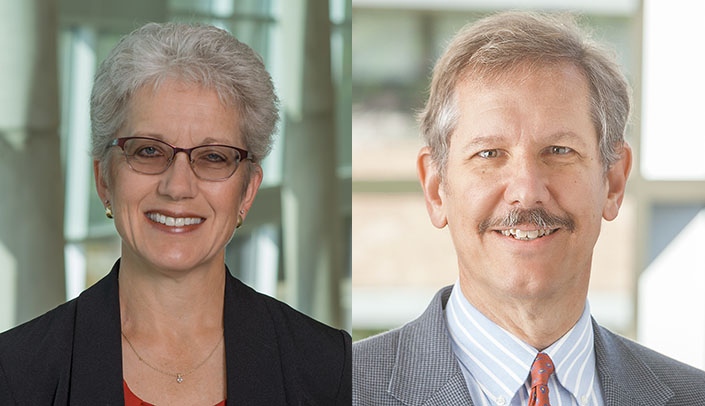A survey assessing the well-being of the Nebraska Medicine workforce will help identify how to reduce the psychological distress caused by COVID-19 on frontline providers and staff who work behind the scenes.
The survey, which appeared in UNMC Today and Nebraska Medicine NOW on April 22, drew responses from 731 health care team members by May 3. The survey was inspired by Robin Lally, PhD, professor at the UNMC College of Nursing, who had read about anxiety and depression among first and second-line hospital workers in Wuhan, China, during their COVID-19 peak.
“I wondered, ‘Are our colleagues experiencing similar stress?'” Dr. Lally said. “We decided, ‘We won’t know unless we ask.'”
“Dr. Lally proposed a solid plan for evaluating the wellness of the health care team and we were eager to collaborate on this initiative,” said Steven Wengel, MD, assistant vice chancellor for wellness at UNMC and UNO. With the help of Nebraska Medicine leaders, representatives from nursing, medicine, psychiatry, psychology and the wellness team quickly develop the survey.
The team
Team members coordinating the creation and administration of the surveys include:
- Dr. Lally
- Dr. Wengel
- Katrina Cordts, PhD
- Juliann Sebastian, PhD, Dean, College of Nursing
- Sarah Richards, MD
- Rachael Schmidt, DNP
- Adam Mills, PhD
- Kevin Kupzyk, PhD
“We wanted to assess at three times — before COVID-19 cases reached a peak at the hospital, after the peak and three months later — to better understand how stress may change over time and to offer wellness strategies that are targeted appropriately,” Dr. Lally said.
Overall, 203 (27.8%) survey respondents reported that thinking about COVID-19 caused them distress. For about half of these individuals, voluntary or involuntary thoughts about COVID-19 caused significant distress. Moderate to severe anxiety was reported by 159 (21.7%) of the 731 total respondents, while moderate to severe depressive symptoms were reported by 69 (9.6%) respondents.
These findings are similar to those of a May U.S. Census Bureau Household Pulse Survey that identified that about 33% of the 42,000 respondents showed signs of anxiety or depression.
“Not surprisingly, many of our front-line providers are experiencing stress,” Dr. Wengel said. “We were pleased to learn that 70% of our colleagues reduce stress through exercise, stress management apps, workshops, spiritual care and/or EAP (Employee Assistance Program). We’d like to continue to get the word out that some simple self-care strategies can make a big difference while continually working to improve and optimize the work environment.”
The wellness team is looking at ways to make engaging in wellness activities easy and the “new normal.”
“We will be seeking input and hope that nurses, physicians, APPs and all those who participate in the care and support of patients will participate in championing wellness in their areas,” Dr. Lally said.
Current resources can be found at the UNMC Wellness website and Nebraska Medicine’s Counseling Resources website.
The second survey is scheduled for later this month.
“We are grateful to all who responded and hope that more colleagues will respond to the next survey in mid-July,” Dr. Lally said, noting that surveys are anonymous and cannot be linked to individuals or an individual’s responses to the earlier survey.
